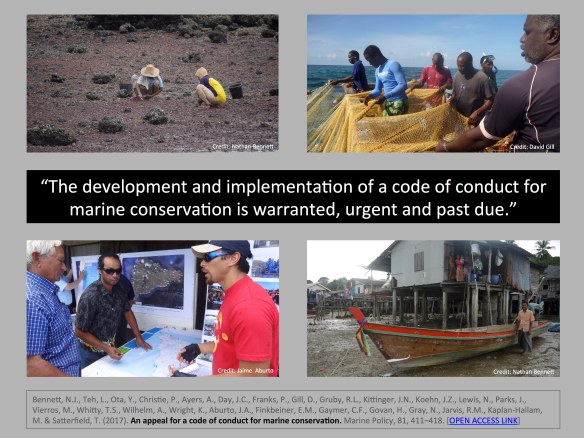
Around the world, the marine and coastal environment is occupied, used and relied on by coastal communities, small-scale fishers, and Indigenous peoples.
Background: Marine protected areas, marine spatial planning, fisheries management, climate adaptation and economic development activities are increasing across the world’s oceans. Coastal communities, indigenous peoples, and small-scale fishers also occupy, use and rely on the ocean and coastal environment for livelihoods, for sustenance, and for wellbeing. An understanding of the human dimensions of the peopled seas is required to make informed marine policy and management decisions. A diverse set of social science disciplines, methods, and theories can be applied to rigorously study the human dimensions of ocean and coastal issues and challenges. Insights from the marine social sciences include:
- Documenting the social context (eg, uses, benefits, values, rights, knowledge, culture) to inform planning and management;
- Characterizing and evaluating the appropriateness and effectiveness of governance processes and management actions;
- Assessing the impacts of conservation, management or development activities on coastal economics and human well-being; and,
- Identifying the social and institutional factors that influence people’s behaviours, actions or responses to identify effective interventions.
The marine social sciences must be part of the mandate and investments of national and international ocean science, policy and sustainability initiatives. Yet, marine social science often receives limited attention and investments from ocean-focused government agencies, NGOs and funders.
Recommendations: Recommended actions include:
- Policy-makers, managers and practitioners need to account for the human dimensions in all marine conservation, marine planning, fisheries management and ocean development decisions.
- Governments should ensure that ocean-focused laws, policies and planning processes require the consideration of social, cultural, economic and governance considerations.
- National and international ocean science and sustainability initiatives, such as the UN Decade of Ocean Science for Sustainable Development (2021-2030), must include social science in their mandates and investments.
- Financial support is needed from ocean-focused government agencies, multi-lateral organizations, NGOs and funders for capacity, programs and infrastructure to enable applied and policy-relevant marine social science research.
|
KEY MESSAGES The pursuit of sustainable oceans must be informed by insights from the marine social sciences. Recent years have seen significant growth in conservation, management and development activities in the ocean. Coastal communities, indigenous peoples, and small-scale fishers also occupy and rely on the ocean for livelihoods, for subsistence, and for wellbeing. Thus, an understanding of the human dimensions is required to make evidence-based decisions across marine policy realms. Greater support for marine social science programs and capacity are needed from ocean-focused government agencies, NGOs, and funders. |
A PDF Version of this Policy Brief is available here: Policy Brief – Marine Social Science and Ocean Sustainability
For more information regarding this topic, see the following paper: N Bennett (2019), Marine Social Science for the Peopled Seas, Coastal Management, 47(2), 244-252. (Link)
Contact: Dr. Nathan Bennett (link) is the Chair of the People and the Ocean Specialist Group of the Commission on Ecological, Economic and Social Policy of the International Union for the Conservation of Nature (link) and the Principal Investigator of The Peopled Seas Initiative.


